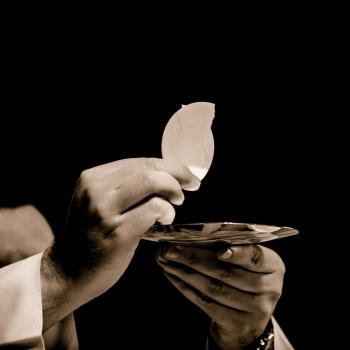 Our conversations about the church’s pastoral prayers led to a conversation this week with my students about the sacrament of confirmation.
Our conversations about the church’s pastoral prayers led to a conversation this week with my students about the sacrament of confirmation.
One astute member of the class observed that his efforts to prepare adolescents for confirmation seemed rather futile. “I’m not convinced that at age fourteen they know what they are promising to do, and they slowly disappear from church after their confirmation. So, aren’t we just ‘graduating’ them?”
The question he raised is a good one.
Heaven knows, young adults frequently disappear from church after they are confirmed. The church itself is in some confusion about what confirmation represents, if anything. And, having emphasized baptism in recent years, many Christians mistakenly think of confirmation as a requirement for membership or the last hoop someone needs to jump through before they can participate as leaders. But the truth is, it’s neither of these things.
One of three sacraments — Baptism and the Eucharist being the others — confirmation is an act of initiation, a “personal Pentecost,” the gifting of the Holy Spirit, and the beginning of a life of service. All three elements are on display in the prayer said at confirmation:
Almighty God, we thank you that by the death and resurrection of your Son Jesus Christ you have overcome sin and brought us to yourself, and that by the sealing of your Holy Spirit you have bound us to your service. Renew in these your servants the covenant you made with them at their Baptism. Send them forth in the power of that Spirit to perform the service you set before them; through Jesus Christ your Son our Lord, who lives and reigns with you and the Holy Spirit, one God, now and for ever. Amen.
But, as important as confirmation is, isn’t also true that it’s wasted on the young, who don’t completely understand it?
I don’t think so.
One, none of us completely know what we are getting into when we receive a sacrament or pray for God to guide us. There is always a learning curve.
Two, for that reason, the sheer difficulty in getting young adults to grasp the significance of confirmation is hardly an argument against the practice.
And there is a third consideration:
The problem isn’t confirmation. It is the preparation and formation – or the lack of it – that we do around confirmation.
In some cases we simply don’t do enough to teach young adults what confirmation is all about, nor do we offer enough instruction when the sacrament is enacted. So, some of the misunderstandings I’ve outlined above, linger and grow.
But I’ve become convinced that the real problems start after confirmation. We leave young people with the impression that they have “graduated” or finished something, rather than alerting them to the fact that confirmation signals a new beginning.
So, here is what I propose:
The next time we confirm a group of young adults, let’s alert them to the fact that they will be required to do join their confirmation class in a week-long mission trip following their confirmation. Instead of telling them, effectively, “There, that’s done, go back to what you’ve been doing all along,” let’s take the words of the confirmation prayer seriously and challenge them to embrace mission as a follow-on to the laying on of hands and the gift of the Holy Spirit. A week spent living out that reality is likely to stick with them far longer than anything we tell them.
And, perhaps at long last, they will begin to grasp the words prayed at their confirmation: “Send them forth in the power of that Spirit to perform the service you set before them…”












